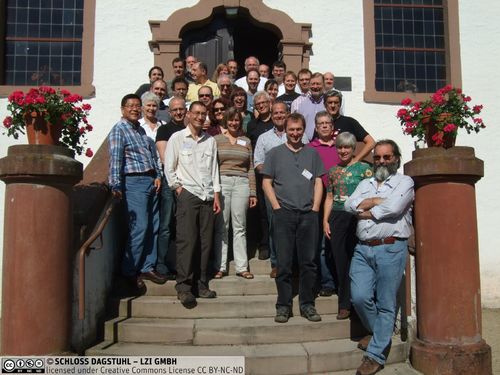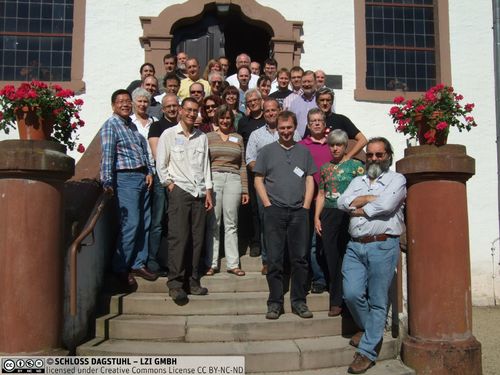Dagstuhl Perspectives Workshop 11331
The Future of Research Communication
( Aug 15 – Aug 18, 2011 )
Permalink
Organizers
- Timothy W. Clark (Mass General Hospital & Harvard Medical School, US)
- Anita de Waard (Elsevier Labs - Jericho, US)
- Ivan Herman (CWI - Amsterdam, NL)
- Eduard H. Hovy (USC - Marina del Rey, US)
Contact
- Annette Beyer (for administrative matters)
Dagstuhl Seminar Wiki
- Dagstuhl Seminar Wiki (Use personal credentials as created in DOOR to log in)
Shared Documents
- Dagstuhl Materials Page (Use personal credentials as created in DOOR to log in)
Sponsors
Publications
- The Future of Research Communication (Dagstuhl Perspectives Workshop 11331). Tim Clark, Anita De Waard, Ivan Herman, and Eduard Hovy. In Dagstuhl Reports, Volume 1, Issue 8, pp. 29-52, Schloss Dagstuhl - Leibniz-Zentrum für Informatik (2011)
- Improving The Future of Research Communications and e-Scholarship (Dagstuhl Perspectives Workshop 11331). Philip E. Bourne, Timothy W. Clark, Robert Dale, Anita de Waard, Ivan Herman, Eduard H. Hovy, and David Shotton. In Dagstuhl Manifestos, Volume 1, Issue 1, pp. 41-60, Schloss Dagstuhl - Leibniz-Zentrum für Informatik (2012)
Impacts
- Dagstuhl Manifesto : Improving Future Research Communication and e-Scholarship : a Summary of Findings : article : pp. 56-58 - Bourne, Philip E.; Clark, Tim; Dale, Robert; de Waard, Anita; Herman, Ivan; Hovy, Eduard H.; Shotton, David - Berlin : Springer, 2012 - (Informatik Spektrum : 35. 2012, 1).
- Feel the FORCE(11) : An Interview with Cameron Neylon - Meadows, Alice; Neylon, Cameron - The Scholarly Kitchen, 2017. - 8 pp..
- Improving The Future of Research Communications and e-Scholarship : Force11 White Paper : 13 pp. - Bourne, Philip E.; Clark, Tim; Dale, Robert; de Waard, Anita; Herman, Ivan; Shotton, David; Hovy, Eduard H. - www.force11.org, 2012 - (The Future of Research Communication and e-Scholarship : FORCE 11 : Manifesto).
Schedule
Research and scholarship lead to the generation of new knowledge. The dissemination of this knowledge has a fundamental impact on the ways in which society develops and progresses, and at the same time it feeds back to improve subsequent research and scholarship. Here, as in so many other areas of human activity, the internet is changing the way things work: it opens up opportunities for new processes that can accelerate the growth of knowledge, including the creation of new means of communicating that knowledge among researchers and within the wider community. Two decades of emergent and increasingly pervasive information technology have demonstrated the potential for far more effective scholarly communication. However, the use of this technology remains limited; research processes and the dissemination of research results have yet to fully assimilate the capabilities of the web and other digital media. Producers and consumers remain wedded to formats developed in the era of print publication, and the reward systems for researchers remain tied to those delivery mechanisms.
Force11 (the Future of Research Communication and e-Scholarship) is a community of scholars, librarians, archivists, publishers and research funders that has arisen organically to help facilitate the change toward improved knowledge creation and sharing. Individually and collectively, we aim to bring about a change in scholarly communication through the effective use of information technology. Force11 has grown from a small group of like-minded individuals into an open movement with clearly identified stakeholders associated with emerging technologies, policies, funding mechanisms and business models. While not disputing the expressive power of the written word to communicate complex ideas, our foundational assumption is that scholarly communication by means of semantically-enhanced media-rich digital publishing is likely to have a greater impact than communication in traditional print media or electronic facsimiles of printed works. However, to date, online versions of "scholarly outputs" have tended to replicate print forms, rather than exploit the additional functionalities afforded by the digital terrain. We believe that digital publishing of enhanced papers will enable more effective scholarly communication, which will also broaden to include, for example, better links to data, the publication of software tools, mathematical models, protocols and workflows, and research communication by means of social media channels.
This document reports on the presentations and working groups that took place during the Force11 workshop on the Future of Research Communication and e-Scholarship held at Schloss Dagstuhl, Germany, in August 2011. More about Force11 can be found at http://www.force11.org.
- Bradley Allen (Elsevier - Manhattan Beach, US) [dblp]
- Aliaksandr Birukou (CREATE-NET - Povo, IT) [dblp]
- Judith A. Blake (The Jackson Laboratory - Bar Harbor, US)
- Philip E. Bourne (UC - San Diego, US) [dblp]
- Simon Buckingham Shum (The Open University - Milton Keynes, GB) [dblp]
- Gully Burns (USC - Marina del Rey, US) [dblp]
- Leslie Chan (University of Toronto, CA)
- Olga Chiarcos (Springer-Verlag - Heidelberg, DE)
- Paolo Ciccarese (Harvard University, US)
- Timothy W. Clark (Mass General Hospital & Harvard Medical School, US) [dblp]
- Laura Czerniewicz (University of Cape Town, ZA)
- Robert Dale (Macquarie University, AU) [dblp]
- Anna De Liddo (The Open University - Milton Keynes, GB) [dblp]
- David De Roure (University of Oxford, GB) [dblp]
- Anita de Waard (Elsevier Labs - Jericho, US) [dblp]
- Stefan Decker (National University of Ireland - Galway, IE) [dblp]
- Alexander Garcia Castro (Universität Bremen, DE) [dblp]
- Carole Goble (University of Manchester, GB) [dblp]
- Eve Gray (University of Cape Town, ZA)
- Paul Groth (VU University Amsterdam, NL) [dblp]
- Udo Hahn (Universität Jena, DE)
- Ivan Herman (CWI - Amsterdam, NL) [dblp]
- Eduard H. Hovy (USC - Marina del Rey, US) [dblp]
- Michael J. Kurtz (Harvard-Smithsonian Center for Astrophysics, US)
- Fiona Murphy (Wiley-Blackwell, US)
- Cameron Neylon (Rutherford Appleton Lab. - Didcot, GB)
- Steve Pettifer (University of Manchester, GB)
- Mike W. Rogers (European Commission Brussels, BE)
- David S. H. Rosenthal (Stanford University Libraries, US)
- David Shotton (University of Oxford, GB)
- Jarkko Siren (European Commission - Brussels, BE)
- Herbert van de Sompel (Los Alamos National Lab., US)
- Peter van den Besselaar (Free University of Amsterdam, NL)
- Todd Vision (University of North Carolina - Chapel Hill, US)
Classification
- society / HCI
- multimedia
- data bases / information retrieval
- academic publishing
Keywords
- science publishing
- online communities
- science policy
- new forms of publishing
- bioinformatics
- digital repositories
- semantic publishing
- citation analysis
- datapublication
- information access and integration
- reporting standards



